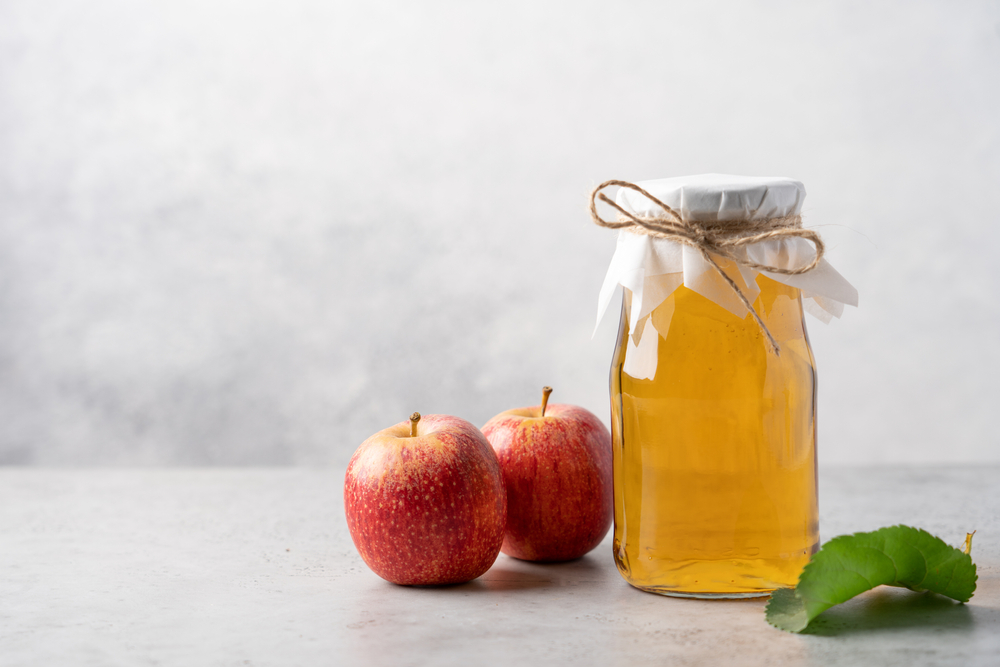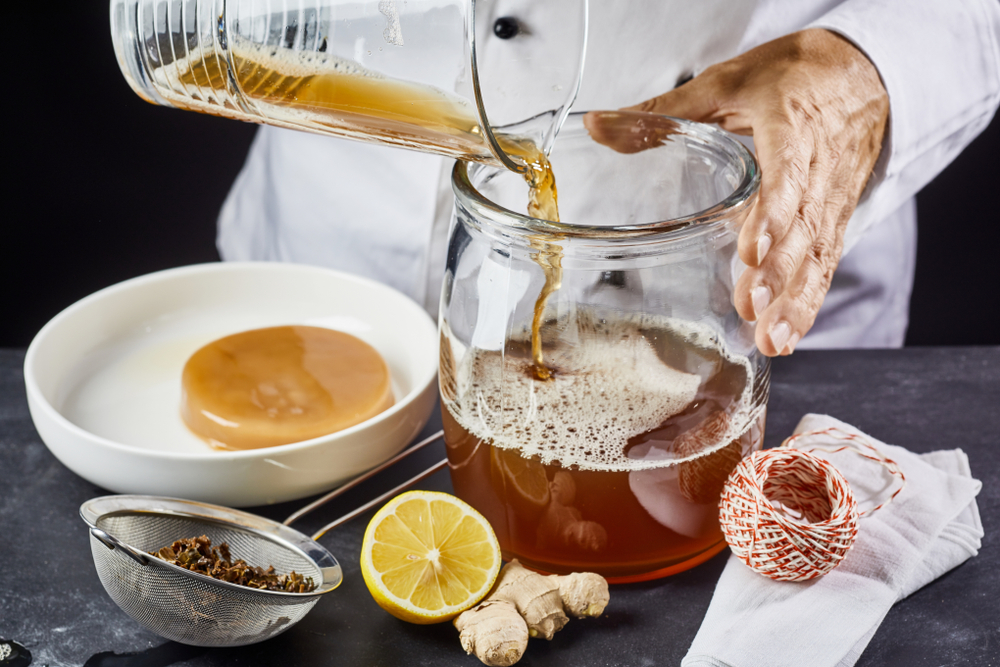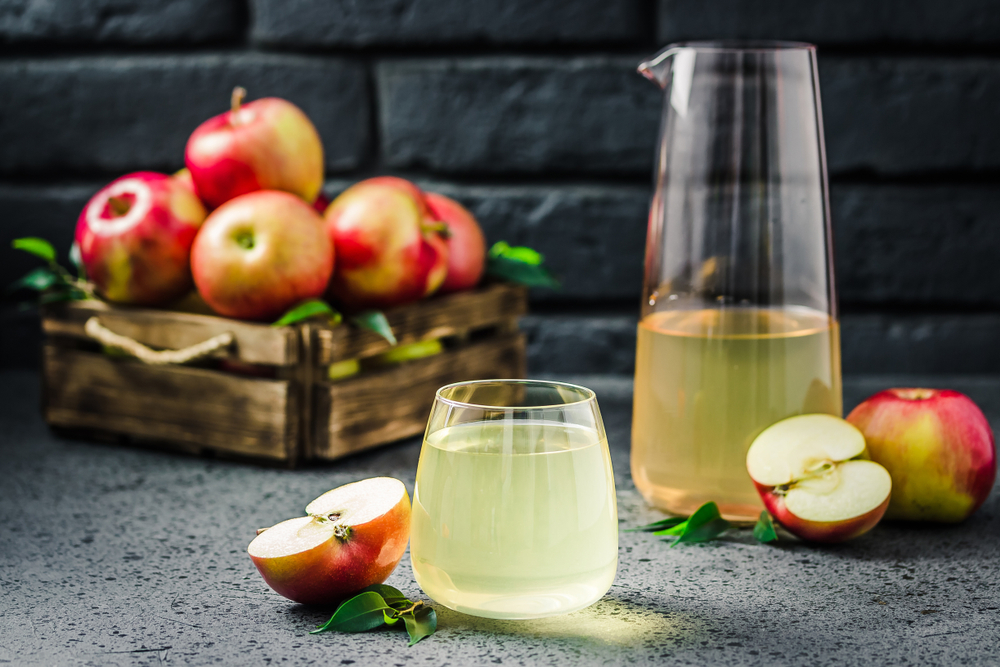The acetic acid in kombucha qualifies it as part of the vinegar family. However, a few significant distinctions exist when comparing apple cider vinegar vs. kombucha. They both host a plethora of health benefits, but one is made from tea, and the other is made from fruit.
Table of Contents
Is Kombucha a Type of Vinegar?
If left to ferment for too long, kombucha will turn into vinegar. However, kombucha vinegar is not as strong as white or apple cider vinegar.
The FDA requires vinegar to have at least 4% acetic acid. Kombucha vinegar is only about 2% acetic acid, whereas ACV is around 5-6%. Though they aren’t quite the same strengths, kombucha can become a type of vinegar.
What Do Apple Cider Vinegar and Kombucha Have in Common?
Both of these healthy liquids:
- Are made using a fermentation process.
- Are made from yeast and bacteria that come from a SCOBY (symbiotic culture of bacteria and yeast).
- Will form a baby pellicle (SCOBY) during the fermentation period.
5 Major Differences When Comparing Apple Cider Vinegar vs. Kombucha
Although people get the two confused, there are multiple differences between these fermented liquids.
| Apple Cider Vinegar | Kombucha |
| Made from fermented apples or apple juice | Made from fermented tea (typically sweetened black or green tea) |
| Contains at least 5% acidic and isn’t something you sip on | Has a slightly sweet and sour taste and is easy to sip |
| Flavor comes from the apples in the fermentation process | Fruity flavor comes from additives in the second fermentation |
| Does not typically have particles floating around | Often contain yeast particles |
| Flat, not carbonated | Fizzy because of the carbonation produced during fermentation |
Health Benefits
Both kombucha and ACV boast several benefits when consumed regularly or even just once.
Apple Cider Vinegar
Some health benefits of ACV may include:
- Killing harmful bacteria: Apple cider vinegar has a history of being used to clean surfaces and preserve foods to keep them from growing bacteria like E. coli.
- Lowering blood pressure: Some studies have shown that consuming apple cider vinegar after a meal may help reduce your blood sugar levels. This can benefit everyone, especially those with type 2 diabetes.
- Aiding in weight loss: Several studies have shown that vinegar can help increase your feeling of fullness, leading to eating fewer calories and weight loss. However, more studies need to be done on this subject to know definitively.
- Improving heart health: Studies have shown that vinegar can help reduce blood pressure in rats and lower cholesterol and triglyceride levels in other animals. However, more studies are needed to confirm whether ACV can improve human heart health.
- Calming acid reflux: Many people swear by ACV for acid reflux, but there is no scientific evidence to back this up. You would need to try it for yourself to see if it holds any truth in your case or not.

Kombucha
Some benefits of drinking this probiotic drink may include the following:
- Improving gut health: The abundance of probiotics in kombucha tea can significantly boost your gut health by promoting good bacteria growth and abundance.
- Boosting your immune system: Kombucha contains antioxidants (especially when made from green tea) that will help your immune system stabilize and ward off illness.
- Lowering cholesterol and helping to prevent heart disease: In rabbit studies, a significant improvement was seen in cholesterol and fasting blood sugar levels when consuming kombucha. However, more human testing needs to be completed to learn more about the effects on humans.
- Killing harmful bacteria: When made from black tea, kombucha has strong antibacterial properties, which can aid in warding off bad bacteria (particularly infection-causing yeast).
- Aiding in weight loss: Kombucha made from green tea may aid in weight loss by increasing the calories you burn, reducing belly fat, and reducing cholesterol levels.

Health Risks
Though both are usually safe to consume, there are some risks you should look out for, especially when consuming them in large quantities.
Apple Cider Vinegar
Some side effects to look out for include:
- Indigestion and/or nausea: Though it is thought to promote the feeling of fullness, some people report that they eat less when consuming ACV because they feel nauseous or have indigestion afterward.
- Erosion of tooth enamel: Any acidic foods or drinks can damage tooth enamel, leading to dental decay over time.
- Drug interactions: It is imperative to note that ACV may interact negatively with certain medications, such as diabetes medicine, certain diuretic medications, and others. Consult your doctor if you are on any medications and want to begin consuming apple cider vinegar.
- Burning of the skin or throat: Because of its highly acidic nature, vinegar can potentially lead to burns in the throat or on the skin.
Kombucha
Some potential risks of drinking kombucha include the following:
- Nausea or GI distress: If you consume too much kombucha, your GI system may become distressed, causing inflammation, nausea, and stomach pains.
- Potentially harmful to certain groups of people: Because of its small alcohol content, live cultures, and microorganisms, kombucha is not recommended for pregnant women or people who have weakened immune systems.
- Possible allergic reactions: Though rare, some allergic reactions have been reported from drinking kombucha.
If you brew your own kombucha, you must be very careful to take all of the proper measurements regarding the brewing process. If this is not done correctly, the beneficial bacteria may not be the only type growing in your kombucha, which can have severe side effects.
Which Should You Drink?
Ultimately, the decision is yours. I can not give you a definitive answer as to which would benefit you more. It all comes down to your personal preferences and budget.

